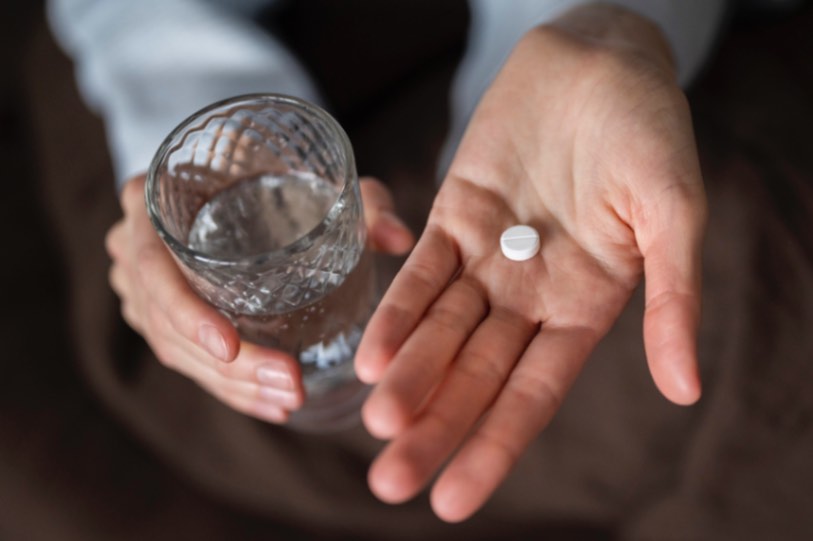Many people believe that taking a baby or low-dose aspirin every day is a safe and easy way to prevent a heart attack or stroke. However, a new study shows that this practice could be dangerous for many people.
Key Points
- Low-dose aspirin may increase the risk of bleeding inside the skull in older adults who have never had a stroke or heart attack.
- About 29 million people in the U.S. take daily aspirin even though they don’t have heart disease, according to the National Institute of Health.
- Doctors still may recommend taking a daily low-dose aspirin as a strategy for people who already have heart disease.
The study published July 26 in JANMA OPEN confirms growing evidence that using aspirin daily has more risk than benefits, especially for older adults who do not already have heart disease.
The report showed that study participants had a 38% higher risk of bleeding in the brain compared to other patients given placebo pills.
Also, there was no reduction in ischemic stroke (the kind caused by a blood clot) among the 19,000 older adults taking low-dose aspirin tracked over several years.
The researchers concluded that the risk of brain bleeding while using “baby” aspirin outweighed any potential benefits for relatively healthy adults aged 60 and older.
What is a stroke?
A stroke is a medical emergency that happens when the blood flow to your brain is interrupted.
There are three kinds:
- Ischemic stroke – Occurs when a blood clot stops blood from flowing to your brain, often due to atherosclerosis, which is a buildup of fatty deposits in the blood vessels.
- Hemorrhagic stroke- When a blood vessel in your brain ruptures or breaks, spilling blood into the surrounding tissues, such as an aneurysm.
- Transient ischemic attack – also known as a “ministroke” when part of the brain experiences a temporary lack of blood flow.
How can aspirin prevent a stroke or heart attack?
Aspirin thins the blood and helps prevent blood clots in the arteries that can cause a heart attack or stroke.
But the blood-thinning quality of aspirin can also make a patient bleed more easily.
Older adults have higher risks of bleeding due to blood vessel ruptures and more chances of falling which could lead to head injuries.
“Primary Prevention” –Preventing a first-time stroke or heart attack.
Some people who do not have heart disease take a daily baby aspirin thinking that it will prevent a first heart attack or stroke.
In 2019, approximately 29 million Americans fell into this category. Almost 7 million did this without a doctor’s recommendation.
For years, middle-aged and older adults were advised to take a baby aspirin a day, to lower the risk of a blood clot forming that would potentially trigger a heart attack or stroke.
Medical experts always knew that there was a risk of internal bleeding in the stomach or the brain. However, they thought the benefits were always higher than the risks.
“What’s becoming clearer and clearer is that aspirin, for primary prevention, is not indicated for most people,” said Dr. Anum Saeed, a cardiologist who was not involved in the study.
However, he explains, “the new findings do not apply to people who have been prescribed aspirin because they already have a history of those conditions, said Saeed, an assistant professor at the University of Pittsburgh Medical Center and a member of the American College of Cardiology (ACC) Prevention Council.
Latest Recommendations for Young and Old
Other experts say the new findings align with the latest recommendations on low-dose aspirin.
Most people with no history of cardiovascular disease, including heart attack or stroke, should skip it.
Dr. Mitchell Elkind, chief clinical science officer for the American Heart Association (AHA), said that while the study focused on older adults, the findings support what’s recommended for younger people, too.
He states “They are consistent with current recommendations from professional societies, including the AHA, that most individuals of any age should not take aspirin for primary prevention,”
For patients who have already had a heart attack or stroke, taking low-dose aspirin every day is still considered an effective strategy.
Conclusion
Most people, especially those 60 and older, shouldn’t take daily aspirin, because of the risk of excessive bleeding.
In people who have a low risk of heart attack, the risks outweighs the benefits of taking a daily aspirin.
Don’t start taking aspirin every day without talking to your health care provider.
For more information about heart health, check out this tracker from the National Institute of health.

Image by Freepik

Thank you, You will be automatically subscribed to the our newsletter.